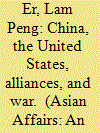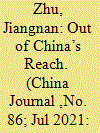| Srl | Item |
| 1 |
ID:
148941


|
|
|
|
|
| Summary/Abstract |
Chinese President Xi Jinping emphatically rejects the so-called Thucydides Trap and its analogy that a rising China is destined for war with the United States, the status quo great power. But there is a contradiction between Beijing's peaceable rhetoric about a “New Type of Major Power Relations” with the US, and Beijing's disregard for the US and its allies. concerns about rising Chinese assertiveness in the East and South China Seas. It is not inconceivable that smaller Chinese and American allies in East Asia might well drag the US and China into a conflict rather than a conflict directly caused by the “power transition” between the two great powers per se.
|
|
|
|
|
|
|
|
|
|
|
|
|
|
|
|
| 2 |
ID:
179169


|
|
|
|
|
| Summary/Abstract |
Individuals who take advantage of global networks to flee abroad with allegedly corrupt proceeds comprise an important yet understudied group of corruption suspects. We characterize them as “globalized corruption fugitives” and, using the case of China, investigate how they take advantage of international loopholes. Under President Xi Jinping, China actively began to pursue such suspects. Our analysis of their backgrounds and how they evade repatriation to China is based mainly on a list of China’s 100 wanted fugitives issued through Interpol Red Notices, supplemented with interviews and documentary data. We find that (1) unexpectedly, government officials did not comprise the majority in the sample; rather, state-owned companies and financial institutions, especially those based in coastal regions, seem to breed fugitive corruption suspects; (2) a tremendous amount of capital has been laundered; (3) Western countries are the most popular destinations of these fugitives, due in part to the protection against repatriation of these countries’ legal systems; and (4) Hong Kong serves as a distinct transit point for fugitives from the PRC’s justice system. This research highlights the transnational dimension of such corruption cases.
|
|
|
|
|
|
|
|
|
|
|
|
|
|
|
|